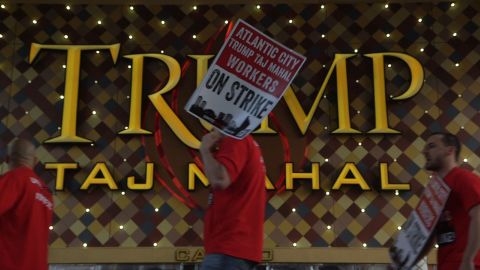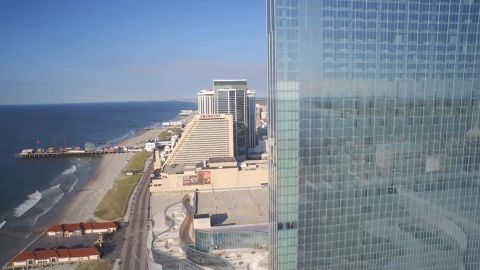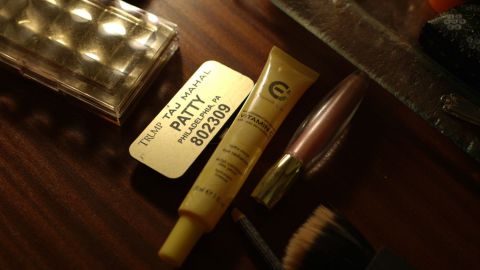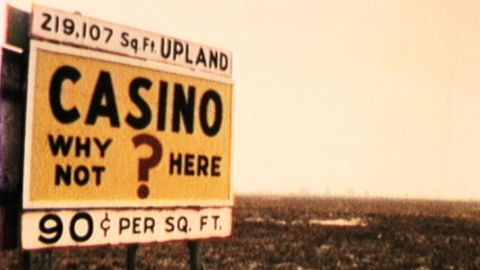By 2014, the fallout from the economic crash of 2008 and other factors resulted in the closing of four casinos, costing 8,000 people their jobs. In this episode, learn about the social, political, natural, and economic factors that lead to the closings, and hear from the workers themselves about the day they learned the doors were closing.
♪♪
>> The story of the Taj Mahal is
really a cautionary tale.
When the Taj Mahal opened,
Donald Trump was the sole owner.
He put $1 billion into the
property.
And it was the premier property
in Atlantic City for many, many
years.
It was a big, well-constructed
property that since around 2004
has begun to degrade.
There's water stains on the
ceiling.
There's urinals and toilets that
have plastic bags over them
because they're not being fixed.
And part of the reason was
Trump sold his interest in it,
which changed the whole dynamic
of these properties, from a real
vibrant place, where he would
show up with Michael Jackson in
tow and go through the casino
floor.
There was always something going
on at the Taj Mahal.
>> I mean, back in the '80s,
they used to have buses.
Every bus that came down here
used to get slot tokens or cash
back as an incentive to come
down.
I don't even believe that the
bus lot is still here.
We don't have any of our
customer base that we had
before I think because of the
decline in our services and our
appearance.
They're gradually making cuts.
They try to cut your workweek
back.
But I didn't think it would ever
come to this.
>> Donald Trump really pioneered
in some sense a problem that we
identify, which is this trend
towards financialization in the
industry.
He financed the Trump Taj Mahal
with junk bonds.
And he was constantly creating
new financial schemes in order
to, in a sense, take as much
money, it seems like, as he
could out of the casinos for
himself and his companies but
not leaving strong businesses in
his wake.
And that's been the trend that
we've seen in Atlantic City in
recent years.
We see more hedge funds, more
private-equity companies coming
in and buying casinos in order
to extract short-term profits,
but not as much concern with
building up the long-term
viability of these businesses.
>> I think Donald Trump's
impact, when he was actually
hands-on, was very positive in
the city.
I'm not trying to make him out
to be some kind of saint.
A lot of people who were waiting
to get paid for construction or
vendors, they got hosed.
There's no question about it.
But they never went after the
employees.
They never tried to take the
employees' wages or take the
employees' benefits.
And it was a place where, for
the most part, you felt
appreciated as a worker.
You really did.
In the last bankruptcy, which
was the third Taj Mahal
bankruptcy, Carl Icahn became
involved, and the story became,
"We just can't operate with
these rich union contracts."
You know, $15 an hour.
Starting wage of $8.50 an hour.
These are big, fat union
contracts.
The only thing they had was
healthcare.
>> Gross gaming revenue peaked
in Atlantic City in 2006.
And then it began to fall
gradually.
And there are three major
reasons for that fall.
The first is that casinos were
popping up in other states and
localities.
It's fewer and fewer miles to
drive to the closest casino
than it was when Atlantic City
had an East Coast monopoly.
The second reason gaming revenue
fell is the financial crisis of
2008 to 2009.
It was like a one-two-three
punch.
There was the market saturation
and competition elsewhere.
There was the great recession.
And then, bang, Atlantic City
got hit with another black eye
with Superstorm Sandy, when the
casinos had to shut down for a
week, and everything was
flooded.
And we're still coming back from
Superstorm Sandy in the
Atlantic City region.
After gross gaming revenue
peaked in 2006, some brain trust
got the idea that we could build
something bigger and better to
bring customers back, something
like one of the best resorts in
Vegas.
And that's where the Revel idea
came from.
Building the Revel was supposed
to be the great savior to
Atlantic City.
>> When they first started
talking about the new casino for
Atlantic City, the whole, big
thing was to make Atlantic City
better.
It was gonna be better for
everybody financially,
popularity.
They were gonna rebuild our
community.
>> Coming home from prison, I
got hired within a month at
Borgata.
The Borgata has some type of
thing with they don't
discriminate against people with
felonies and stuff.
They'll give you a chance.
Then I resigned because Revel
was being built, and I had an
opportunity to make double what
I was making at Borgata.
So, I jumped ship, resigned, and
went over there to do
construction.
And then the recession came in
2008.
Now the real big trouble starts.
>> I didn't see the writing on
the wall.
I worked at Trump Plaza for
28 years, and I decided to take
a leap of faith and open the
Revel because it was the newest,
most beautiful casino in
Atlantic City, and I wanted to
be a part of that.
>> I started on opening day.
And it was awesome.
I've been to Vegas.
I've lived in Atlantic City so I
know the feels of the different
casinos.
When I walked in the Revel, it
was definitely, definitely a
beautiful place to be a part of.
>> They had a no-smoking policy,
which was very nice for a
casino and had windows, where
most casinos don't have windows
'cause they don't want you to
see the daylight.
We had great views of the ocean
and the moon coming up over the
ocean at night.
And if you played into the wee
hours, you could see the sun
rising.
It was a beautiful sight.
They gave us high hopes when we
signed on at the Revel.
Many promises -- bonuses,
incentives -- which they never
followed through on because they
weren't turning a profit.
>> When the Revel started having
their difficulties and now
they're financially in a rut,
they started cutting back our
hours.
And when they did that, then we
lost our benefits, because now
everybody was considered
part-time.
>> We were really turning a
corner and becoming successful
when they sent out a warn notice
to let us know they were closing
within 60 days.
We opened in April of 2012, and
it closed September 1, 2014 --
about 2 1/2 years.
>> Pink slips went out to
Trump Plaza workers today.
The casino plans to close.
>> The Atlantic Club casino did
close half a year ago, and
Showboat's 2,000 workers?
They got their bad news today.
>> I call it the year of the ax.
Four casinos closed -- one after
the other after the other.
8,000 employees lost their job
over the course of the year.
But 8,000 employees is just the
minimum number, because of the
ripple effect or the multiplier
effect, because one person in
the casino loses their jobs, and
it affects other people outside
of the industry.
It affects people who do their
dry-cleaning.
It affects people who do their
hair.
It affects childcare workers.
So, it really is a downward
spiral.
>> There's a real human tragedy
going on here, and it's the same
that's been played out all over
the country over the last
30 years.






